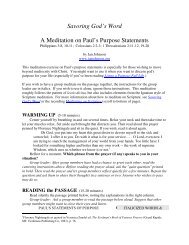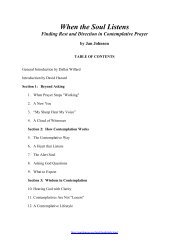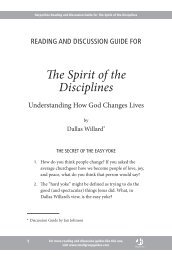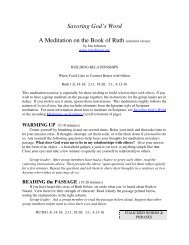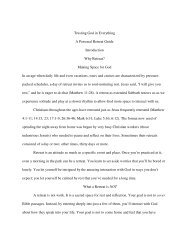FREE Download - Jan Johnson
FREE Download - Jan Johnson
FREE Download - Jan Johnson
You also want an ePaper? Increase the reach of your titles
YUMPU automatically turns print PDFs into web optimized ePapers that Google loves.
Healing Hurts that Sabotage the Soul<br />
by Curt Grayson and <strong>Jan</strong> <strong>Johnson</strong><br />
Chapter 4: THE HANDICAP OF BEING HUMAN<br />
The inability to be the Christian we'd like to be is not a newfangled psychological malady:<br />
Chronic Faithlessness Syndrome. It's a universal problem for humankind. It flourishes when we<br />
pretend it's not there and it blooms wherever it's planted. The garden is the entire human race<br />
and the growing season began with the Fall of humanity.<br />
Adam and Eve experienced the painful regret and dashed hopes many people do today.<br />
What could have been more "downwardly mobile" than being banished from the Garden of Eden?<br />
What could have been more shaming to them as parents than for one of their children to murder<br />
another, as Cain killed Abel?<br />
After the Fall, Adam and Eve found that thorns and thistles grew not only from the ground,<br />
but also between each other. Part of the curse was that they would try to control each other:<br />
"Your desire will be for your husband, and he will rule over you" (Gen. 3:16). We can only<br />
guess how worthless they may have felt as the curse produced turmoil in the key areas that<br />
supply self-worth: making a living (tilling the fields) and childbearing (Gen. 3:16-19). This<br />
first family in history splintered as its members reacted with denial, blame, isolation and acting<br />
out of anger. These four tendencies have been handed down through families for generations<br />
until they have permeated every home and every culture.<br />
DENIAL "they hid from the Lord God . . . ."<br />
We tend to think that most of life's problems are like hiccups; they'll go away if we ignore<br />
them long enough. This can grow into denial -- acting as if painful events never occurred,<br />
pretending to be fine when we're not. Adam and Eve's behavior illustrates three rules for denial, 3<br />
which set them up for failure and disappointment .<br />
Don't talk<br />
After the couple disobeyed God by eating from the tree of knowledge of good and evil, they<br />
didn't seek God in repentance and despair. They didn't approach God as children who trust their<br />
parents do, saying, Look what we've done. We're sorry. What can we do? Instead, they hid (Gen.<br />
3:8). When God confronted them, they didn't admit guilt or ask for forgiveness.<br />
Don't trust<br />
When the serpent said Adam and Eve wouldn't die if they ate from the tree of the knowledge of<br />
good and evil, he contradicted God's words (Gen. 3:4-5). Adam and Eve trusted the serpent<br />
instead of God, the one who had given them every reason to trust Him. He had provided their<br />
3 "Don't talk, don't trust, don't feel" are three rules that Claudia Black popularized in her book, It Will Never Happen<br />
to Me (Denver, CO: M.A.C. Printing and Publications Division, 1982), chap. 3, 31-52.



